Final Cumulative Exam Practice
1/49
There's no tags or description
Looks like no tags are added yet.
Name | Mastery | Learn | Test | Matching | Spaced |
|---|
No study sessions yet.
50 Terms
The fluid-mosaic model of the plasma membrane suggests that
Multiple Choice
proteins are not a part of the membrane.
the membrane is neither rigid nor static in structure.
cholesterol forms the outermost layer of the membrane.
proteins form a "liquid" sea in the membrane.
phospholipids form a single lipid layer in the center of the
membrane.
the membrane is neither rigid nor static in structure.
An organelle is
Multiple Choice
the basic structural unit of all living organisms.
a group of organs with a common set of functions.
a group of cells with similar structure and function.
a small structure within a cell.
a structure composed of several tissue types.
4
The smallest particle of an element that still exhibits the chemical characteristics of that element is a/an
Multiple Choice
chemical bond
atom
electron
orbital
proton
2
Cephalic means
Multiple Choice
away from the surface.
toward the middle or midline of the body.
closer than another structure to the point of attachment to the trunk.
closer to the head.
toward the back of the body.
4
Homeostasis is defined as
Multiple Choice
the combination of growth, self-repair, and energy release.
an amplification of deviation from the normal range.
the maintenance of a relatively constant environment within the body.
a condition in the body that does not involve fluctuation.
the production of energy by cells.
3
Match the molecule with the correct process in protein production.
Contains the information necessary to produce proteins through gene expression (____)
Carries amino acids to the ribosome (____)
Contains the information from DNA known as the genetic code (___)
Is combined with proteins to make ribosomes (__)
Options: tRNA, mRNA, rRNA, DNA
DNA
tRNA
mRNA
rRNA
In the anatomical position, the
Multiple Choice
body is erect with the head turned to the right.
arms are crossed over the chest.
palms of the hands face anteriorly.
thumbs point to the midline of the body.
palms of the hands face posteriorly.
3
Identify the functions of the integumentary system.
Check All That Apply (more than 1 answer)
Blood cell production
Resistance to infection
Sensation of environmental stimuli
Thermoregulation
Vitamin E synthesis
2, 3, 4, 5
Indicate whether each statement is true or false.
The ph scale is a measure of oxygen concentration in a solution.
The pH scale indicates the concentration of H+ in a solution.
The pH scale ranges from 0 to 14.
Neutral solutions have a pH of 7.
Solutions with a ph greater than 7 are acidic.
Solutions with a pH greater than 7 are basic (alkaline).
False
True
True
True
False
True
The four most abundant elements in the human body are
Multiple Choice
carbon, hydrogen, oxygen, and nitrogen.
calcium, hydrogen, sodium, and potassium.
carbon, sulfur, calcium, and potassium.
carbon, oxygen, magnesium, and zinc.
carbon, hydrogen, oxygen, and iron.
1
A tissue is a
Multiple Choice
structure contained within a cell.
group of cells with similar structure and function.
structure that contains a group of organs.
group of organs that performs specific functions.
lower level of organization than a cell.
2
Which type of transport proteins use cell energy to move molecules across the plasma membrane?
Multiple Choice
Ligand-gated ion channels
Cadherins.
ATP-powered pumps
Leak-ion channels
3
The superficial layer of epithelium of the skin is called the
Multiple Choice
dermis
epidermis
hypodermis
papillary layer
mesodermis
2
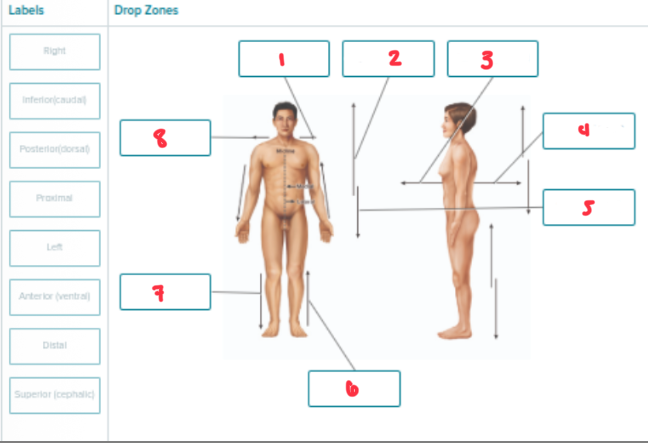
Label the following anatomical position
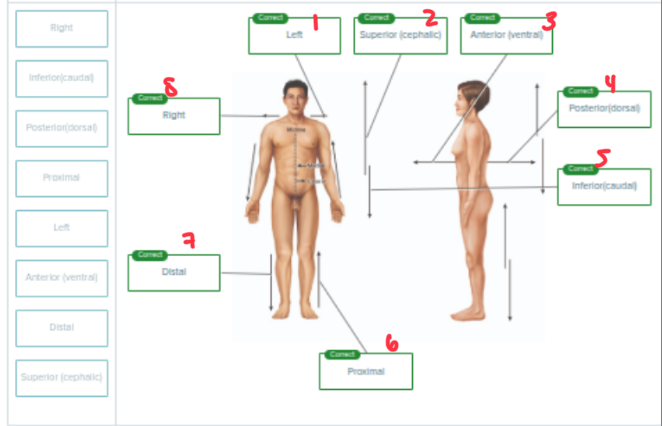
Which of the following best describes a proton?
Multiple Choice
One negative charge, no mass, found in orbitals
One positive charge, mass of one, found in nucleus
Subatomic particle with no electric charge
No charge, mass of one, found in nucleus
None of the choices are correct.
2
Anatomy is
Multiple Choice
the study of structure.
the study of living organisms.
the study of function.
a branch of physiology.
the study of homeostasis.
1
What plane divides the body into equal right and left halves?
Multiple Choice
Transverse
Frontal
Coronal
Median
4
A protein called ____ is found in the nails, hair, and epidermis.
Multiple Choice
keratin
carotene
melanin
collagen
elastin
1
The term "dorsal" means
Multiple Choice
farther from the point of attachment to the body.
toward the back of the body.
away from the midline.
to lie with the anterior surface down.
toward the front of the body.
2
A cell is
Multiple Choice
a group of organs with a common set of functions.
a group of atoms with similar structure and function.
a structure composed of several tissue types.
a small structure within a molecule.
the basic structural unit of living organisms.
5
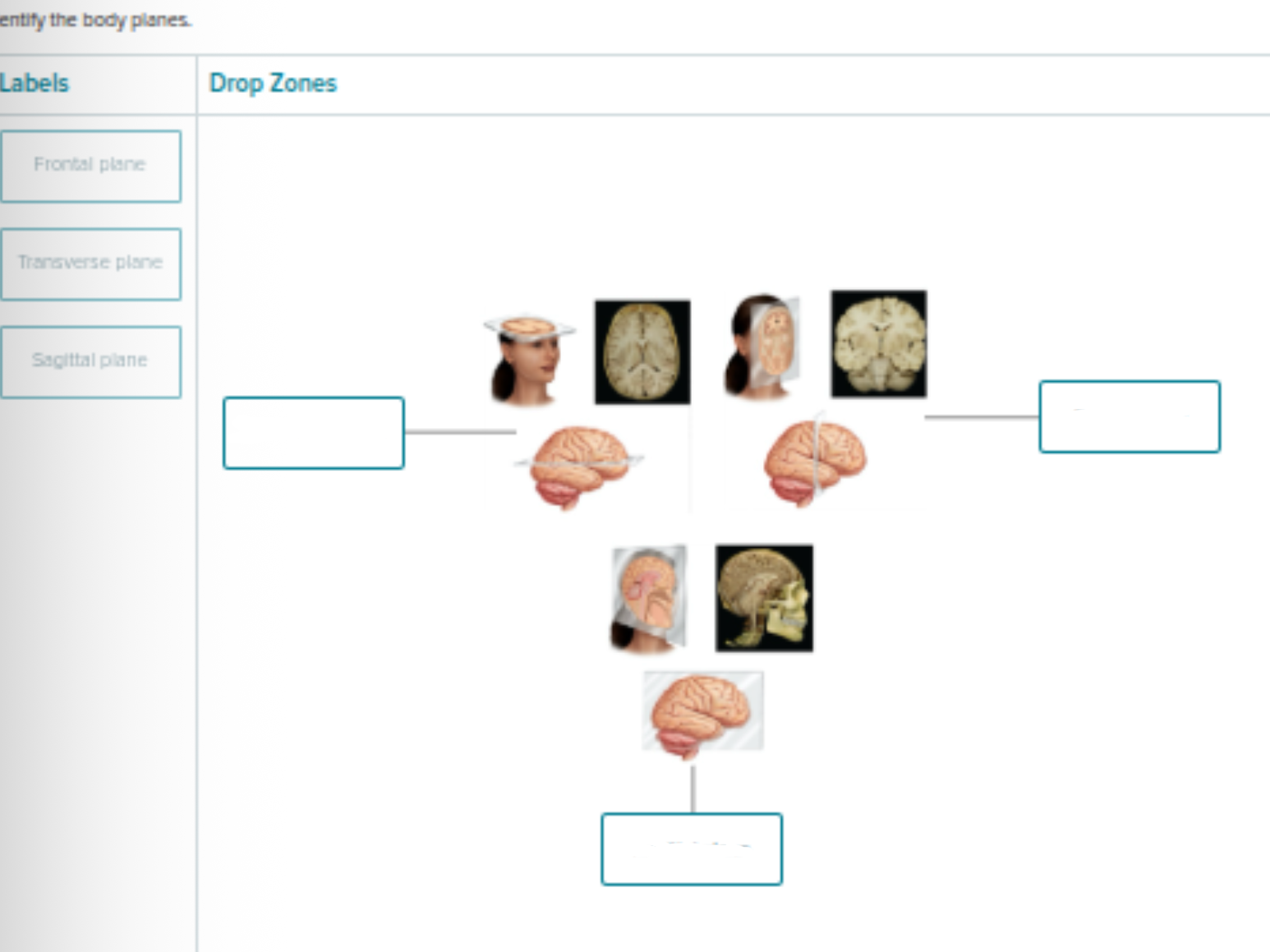
Identify the body planes
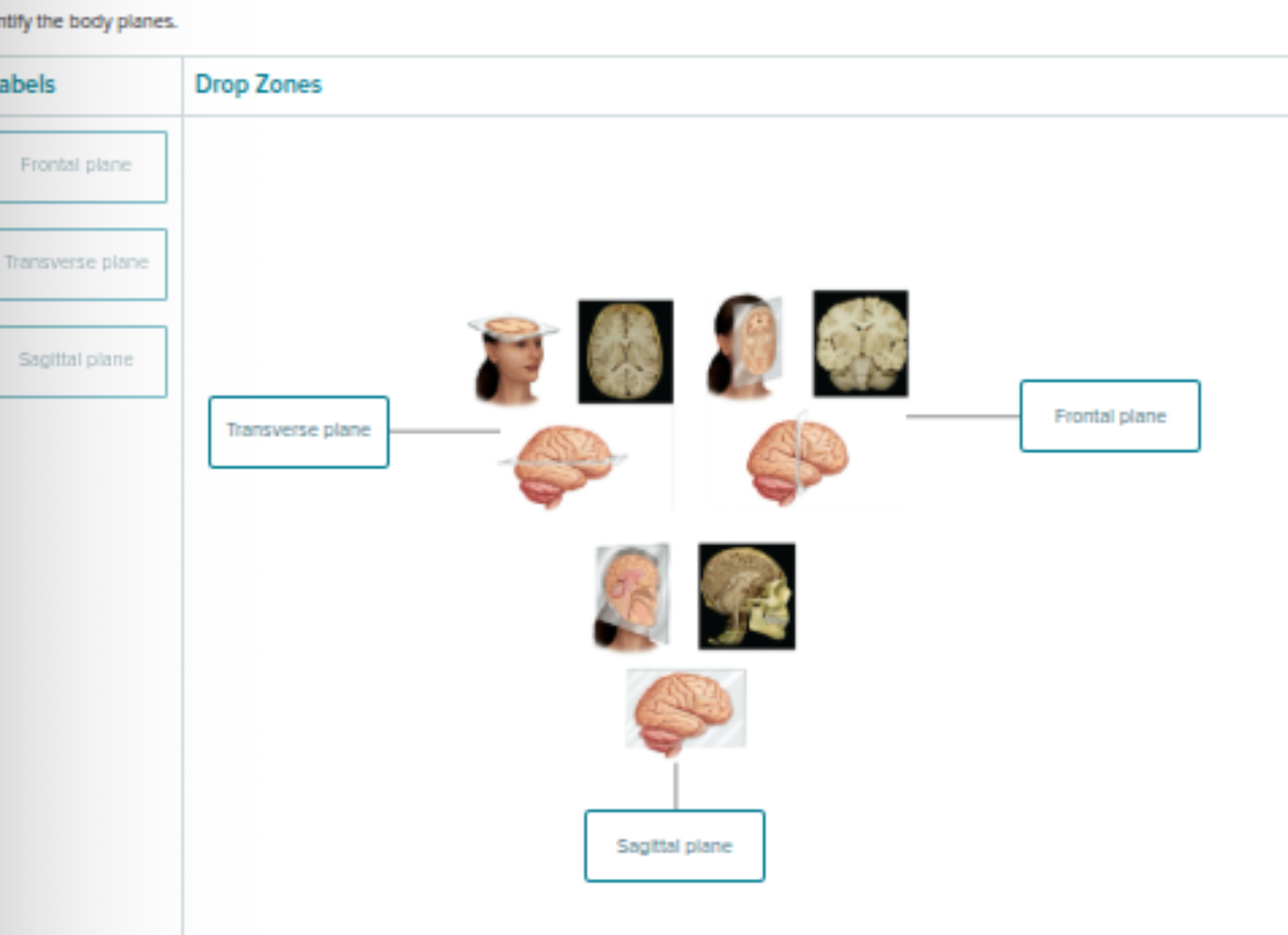
The structural and functional unit of all living organisms is the
Multiple Choice
ribosome
cell
plasma membrane
organelle
organ
2
Explain: the ORGANELLE would not be the strucutural and functional unit of ALL living organisms because BACTERIA DON’T HAVE ORGANELLES and they’re still a part of living organisms
Which of the following describes the position of the nose?
Multiple Choice
Superior to the mouth
Superior to the forehead
Lateral to the eyes
Inferior to the chin
Posterior to the ears
1
The primary determinant for skin color is the __________ not the ________
Options: number of melanocytes, amount of melanin
Amount of melanin; number of melanocytes
Explanation in CH 5 notion page
Complete the following sentences.
The time between cell divisions is called ____
Cytokinesis is completed at the end of ____.
Chromosomes align along the equator during __
Chromosomes begin migrating towards poles of the cell during ____
Options: anaphase, metaphase, interphase, telophase
Interphase
Telophase (it starts during anaphase)
Metaphase
Anaphase
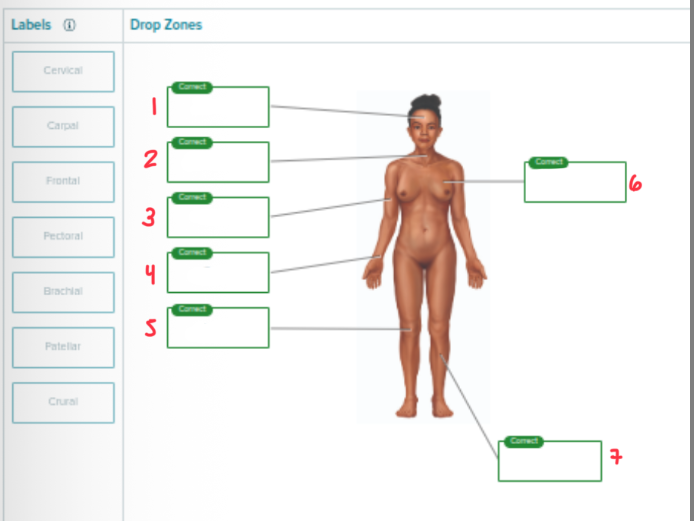
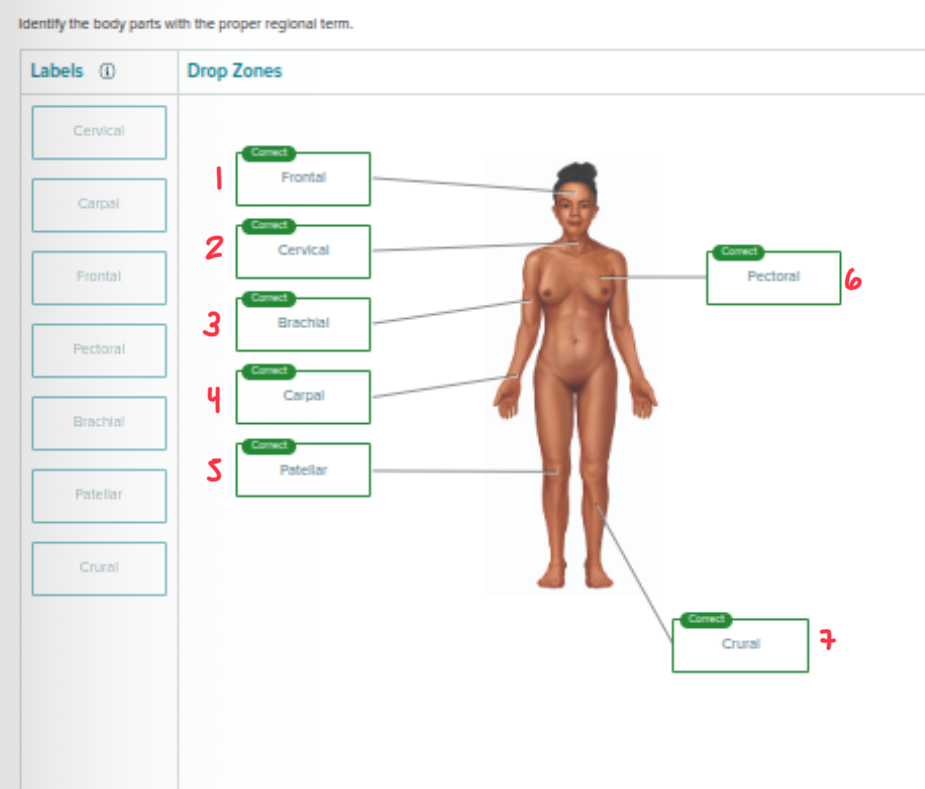
The plasma membrane is selectively permeable. This means
Multiple Choice
substances need carier molecules to pass through it.
ATP is always needed to move molecules acrois the plasma membrane.
substances need permission to pass through it.
only gases and water can pass throughit.
only certain substances can pass through it.
5
The layer of epidermis that undergoes mitosis and forms new epidermal cells is the
Multiple Choice
stratum lucidum
stratum corneum
stratum dermum
stratum granulosum
stratum basale
5
Explain: Remember “Come Let’s Get Sun Burnt”. This would explain the superficial to deep layer of the skin
Which of the following functions is associated with the skin?
Multiple Choice
Lipid production
Protection against ultraviolet radiation of the sun
Vitamin A production
Regulation of body pH
Vitamin C production
2
Match the description with the appropriate term.
Solutions with the same concentration of solute particles are called _______
If one solution has a greater concentration of solute particles than the other it is _____
The solution with the lower osmotic pressure is __
If a cell is placed in a solution and it shrinks, the solution is ____
If a cell is placed in a solution and it swells, the solution is ___
If a cell is placed in a solution and it neither swells nor shrinks, the solution is _____
Options: Isotonic, Isosmotic, Hyperosmotic, Hyposmotic, Hypertonic, Hypotonic
Isosmotic
Hyperosmotic
Hyposmotic
Hypertonic
Hypotonic
Isotonic
Explain: if something is HYPERTONIC, there’s A LOT OF WATER INSIDE THE CELL, making the cell SHRINK because the water is going to go to the area that lacks water concentration
For HYPOTONIC, there’s going to be very LITTLE water concentration INSIDE CELL, so the cell is going to BURST because there’s going to be lot more water going inside
In general, water-soluble molecules diffuse through the through the ____ and lipid-soluble molecules diffuse ____
Multiple Choice
None of the choices are correct.
lipid bilayer; membrane channels
membrane channels; membrane channels
membrane channels; lipid bilayer
lipid bilayer; lipid bilayer
4
The mass number of an atom is the number of
Multiple Choice
electrons plus neutrons in the atom.
protons in the atom.
neutrons plus protons in the ator.
neutrons in the atom.
protons plus electrons in the atom.
3
Posterior means
Multiple Choice
closer than another structure to the point of attachment to the trunk.
away from the surface.
closer to the head.
toward the back of the body.
toward the middle or midline of the body.
4
Complete the sentences by selecting the correct terms from the dropdown menus.
Anything that has weight and takes up space is defined as _____ .
The ____ of each element have unique structures (unique number of protons, neutrons, a
electrons).When atoms of different elements chemically unite to form molecules, they form molecules of a _____
Options: atoms, matter, compound
Matter
atom
Compound
Medial means
Multiple Choice
toward the middle or midline of the body.
toward the back of the body.
away from the surface.
closer to the head.
closer than another structure to the point of attachment to the trunk.
1
The anatomical term that means "away from the midline of the body" is _
Multiple Choice
distal
superficial
lateral
medial
proximal|
3
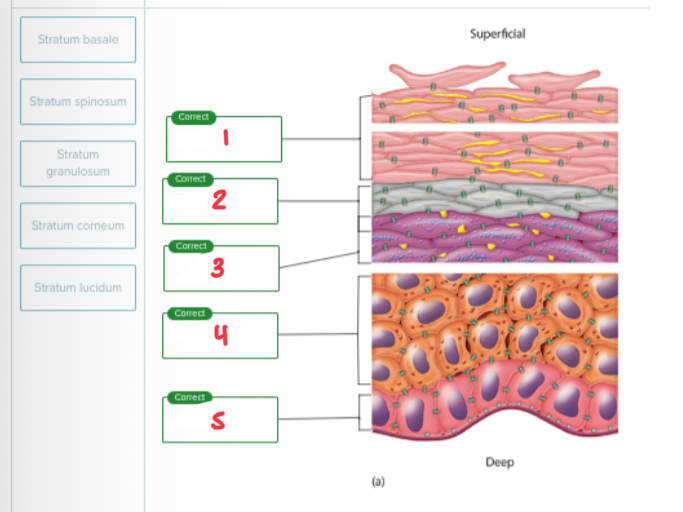
Label the following
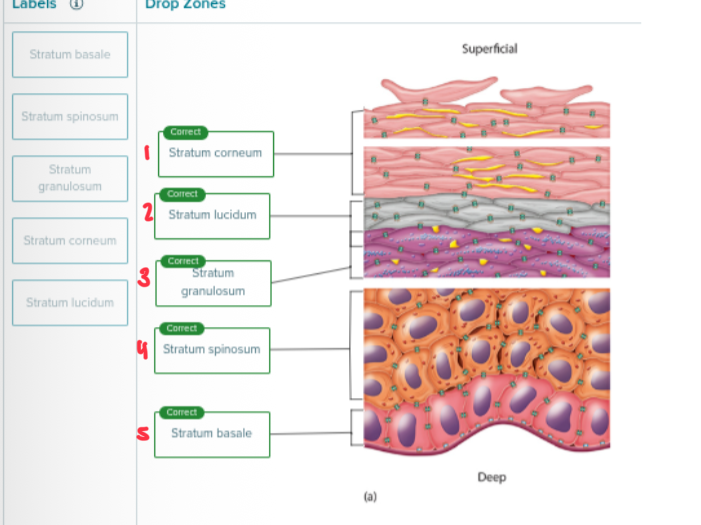
Which of the following represents the correct order of the layers of the epidermis from the deepest to the most superficial?
Multiple Choice
Stratum lucidum, stratum granulosum, stratum corneum, stratum basale, and stratum spinosum
Stratum basale, stratum spinosum, stratum granulosum, stratum lucidum, and stratum corneum
Stratum corneum, stratum lucidum, stratum granulosum, stratum spinosum, stratum basale
Stratum basale, stratum granulosum, stratum lucidum, stratum spinosum, and stratum corneum
Stratum spinosum, stratum basale, stratum lucidum, stratum corneum, and stratum granulosum
2
In a negative feedback mechanism, the response of the effector
Multiple Choice
enhances the original stimulus.
creates a cycle that leads away from homeostasis.
nas no chest on ine onciner sumu us.
Is usually damaging to the body.
reverses the original stimulus.
5
The aroma of cookies baking in the kitchen reaches you in the living room. The distribution of this odor throughout the house is an example of
Multiple Choice
active transport
tnration|
osmosis
dialysis
diffusion
5
Explain: this is diffusion because the aroma of the cookies have a HIGHER CONCENTRATION AT THE KITCHEN, but then it starts to move to an area with LOW concentration, hence the reason why it would be diffusion.
The overall definition of diffusion is something going from HIGH TO LOW concentration
The epidermis
Multiple Choice
Is composed of loose connective tissue.
is made up mostly of melanocytes.
contains no blood vessels.
is composed of the reticular and papillary layers.
Is thicker than the dermis.
3
Explain: Number 5 wouldn't be an answer because the EPIDERMIS IS ALWAYS THINNER than the dermis
Number 1 wouldn’t be the answer because it’s made of STRATIFIED SQUAMOUS EPITHELIUM TISSUE…NOT CONNECTIVE tissue
Indicate whether each statement is true or false.
Thin skin generally does not contain the stratum lucidum.
Thick skin is found in areas of high friction, such as the palms of the hands and the soles of the feet.
Thick skin is generally more flexible than thin skin.
Hair is found in both thin skin and thick skin.
True; for thin skin the abbreviation would be “Come GET sun burnt”
True
False
False; hair is FOUND IN THIN SKIN, NOT thick skin
The plasma membrane
Multiple Cholce
has a single layer of phospholipids.
is a rigid protein membrane.
separates the nucleus from the rest of the cell.
is not permeable.
regulates movement of materials into and out of the cell.
5
Explore some of the properties of atoms by choosing the correct word from the dropdown menu to complete each
The smallest units of matter that have the characteristic properties of a chemical element are called _____ .
The chemical properties of atoms can be described in terms of three subatomic particles: _______.
neutrons, and electrons.The protons and neutrons are confined to a very small volume at the center of an atom called the _______.
The _______ revolve in orbitals at various distances from the nucleus.
Each chemical element contains a specific number of protons, and it is this number, called ________ that distinguishes one atom from another
Options: Protons, atomic nucleus, electrons, atoms, atomic number
Atoms
Protons
Atomic nucleus
Electrons
Atomic number
A symporter will transport _ across the plasma membrane.
Multiple Choice
two of the same lons or molecules in opposite directions
two different ions or molecules in the same direction
two different lons or molecules in opposite directions
two of the same ions or molecules in the same direction
one specific ion or molecule
2
Vitamin A, a fat-soluble vitamin, would move across the plasma membrane into the cell
Multiple Choice
by transport with carrier molecules.
through vitamin membrane channels.
by active transport.
by dissolving in the lpid bilayer.
In vesicles.
4
Explain: since this is a FAT-SOLUBLE VITAMIN, this would be able to dissolve through the bilayer because the bilayer allows soluble substances and vitamins to dissolve through
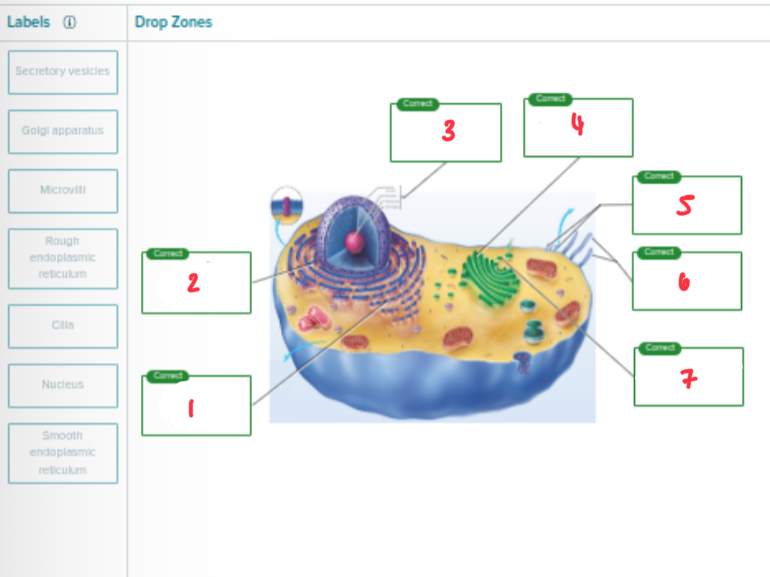
Label the following
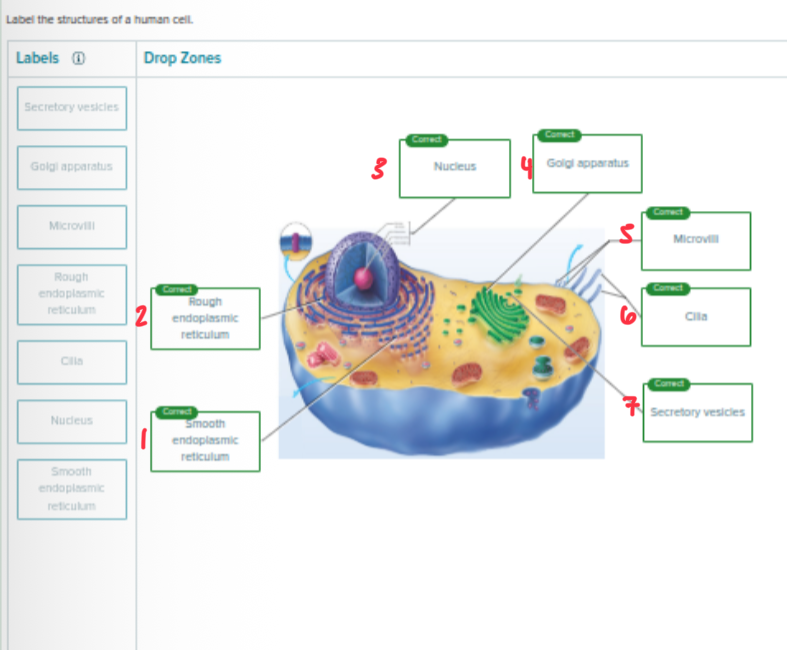
Electrons
Multiple Cholce
do not participate in the bonding of atoms.
have a positive charge of one.
are located in the nucleus of an atorn.
are the subatomic particles most involved in bonding behavior of atoms.
comprise the majority of the mass of an atom.
4
Translation is the synthesis of_
Multiple Cholce
proteins from DNA
mRNA from proteins
proteins from tRNA
mRNA from DNA
proteins from mRNA
5
Which type of membrane proteins allow cells to identify one another?
Multiple Choice
Receptor proteins
Marker molecules
Carrier proteins
Enzymes
Channel protein
2